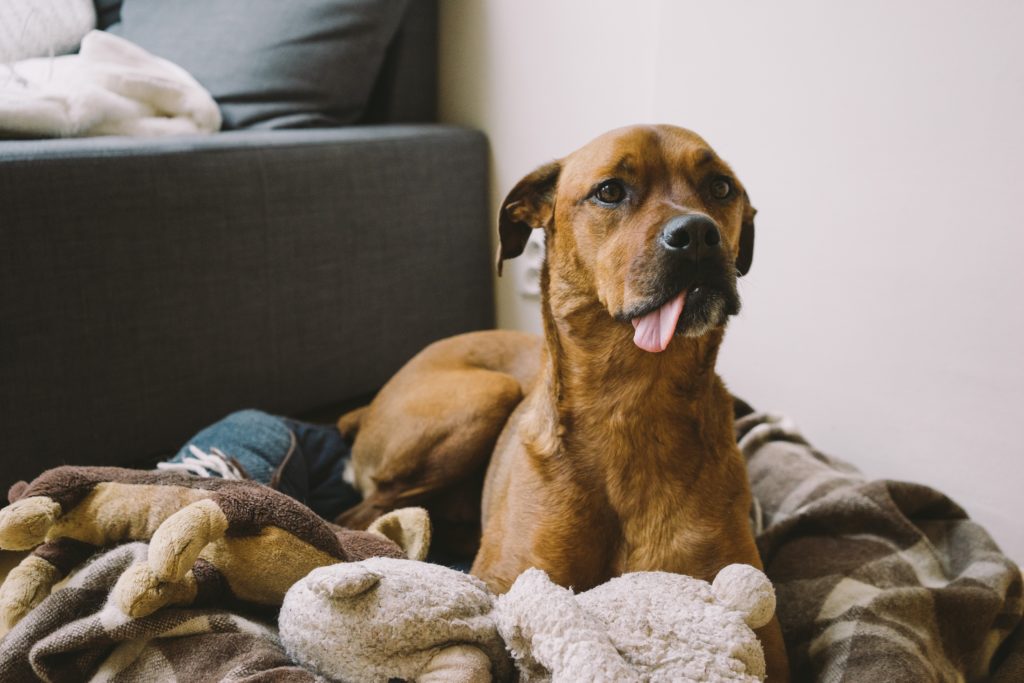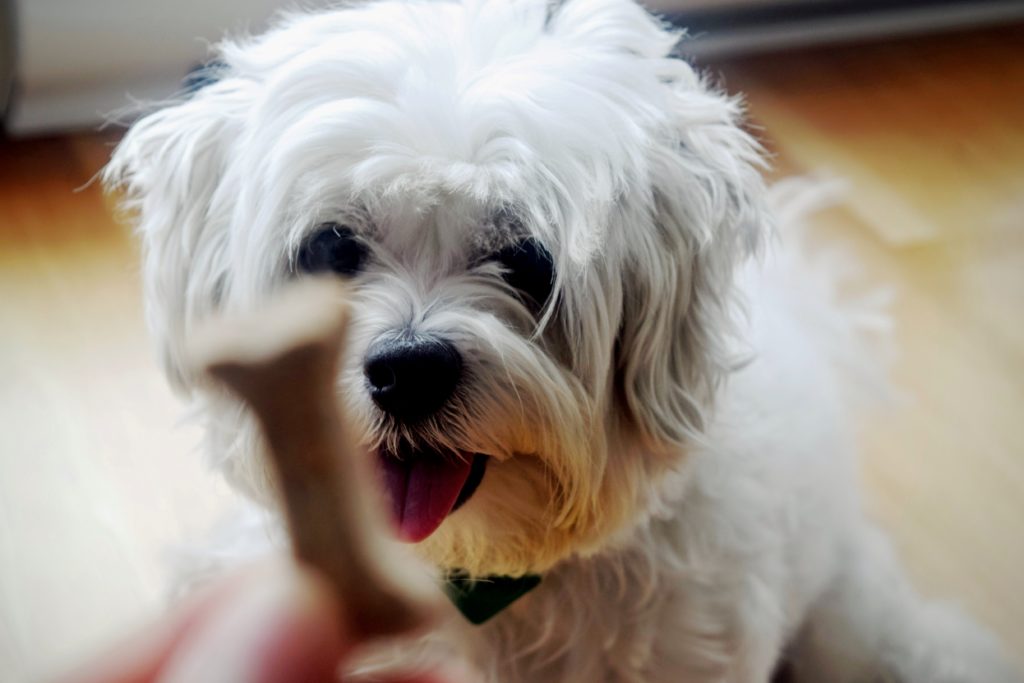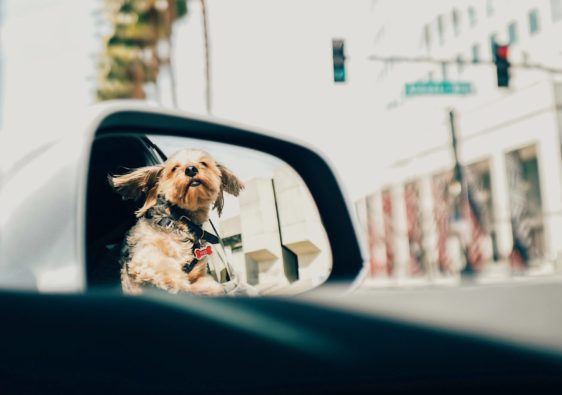One year after adopting our senior dog in Malta, I wanted to share the biggest lessons learned so far. Read on to learn more about adopting a senior dog and ensuring a smooth transition.
♥

Background story: Bo
On February 15th 2019, my fiancé and I adopted our dog, Bo. Originally named Bailey, Bo is a senior Shih-Tzu now with his third (and final) family.
When we adopted him, his owners told us that he was six years old and fully vaccinated. We quickly learned that he had not turned five yet, never finished his puppy vaccination, and also needed to get neutered to not risk getting testicular cancer.
The first year with Bo was filled with highs and lows, but I would not change it for the world. We didn’t set out to adopt a Shih-Tzu specifically, but I have since realised that many people are interested to adopt a Shih-Tzu in Malta. A year after getting Bo we also adopted a cat in Spain and they are now living (mostly) happily together.
With the experience of adopting and “raising” a senior dog, I wanted to share my best tips and key takeaways.
Why should adopt a senior dog?
We chose not to adopt a puppy for many different reasons. Mostly it was the fact that there were so many senior dogs needing (and not getting) a new home.
Many families prefer adopting puppies. But adopting a 2, 5, or even 10-year-old dog can be just as (if not even more) rewarding.
Lessons learned from adopting a senior dog
Below you’ll find my most important lessons learned from adopting a senior dog in Malta. Remember that each dog and story is unique, but hopefully, my experience can be helpful along the way.
1. Your dog will need time to adjust
On our first night with Bo, he bit my fiancé pretty badly. It wasn’t the best start, but we understood that he was stressed. He needed some time to adjust to us and his new living situation, and we also needed some time to get to know him. But when weeks passed and he was still having frequent tantrums and biting episodes, we started to get a bit worried.
Through most of our research online, we read that adopted dogs normally needed a few weeks (or less) to adjust to their new home. But when we went to see a behaviourist, we learnt a somewhat reassuring fact: Adopted dogs will generally take 3 months (and might take even longer) to settle in their new home.
Adopted dogs will normally take 3 months to adjust to their new home
Sort of like magic, that seemed to be the timeline for us. The first three months had a slow but steady progress. Then, right around the three-month mark, it was like it all fell into place. That is not to say our dog is no longer throwing tantrums, but he is so much better than before. He is comfortable with us and our home.
How long does it take for a senior adopted dog to adjust?
This will depend on the dog and its history, but generally, it can take up to three months or more for an adopted dog to adjust to the new living situation and family.
2. Make sure your dog is healthy – and get insurance
If we had adopted from a Malta shelter, we would know more about our dog and its health. But we adopted our dog privately, naively trusting that the previous owners had taken care of him and his health. Even though we got his vaccination card and thought everything was up to date, upon looking at it, we quickly realised they never even finished his puppy vaccinations. Needles to say, we went straight to the vet.
When adopting your dog, it is really important to make sure that the dog is healthy and has all vaccinations. If you do not adopt from a shelter where this is already sorted, head straight to the vet after adopting your senior dog. Do a general check-up and ensure that everything is up to date.
In hindsight, I would also recommend insuring your adopted senior dog. We didn’t insure Bo right away and definitely regretted that when we had to spend most of January this year back and from the vet after his eye got injured.
How can I ensure my dog in Malta?
If you are interested in dog insurance in Malta, there are several companies to choose from. Browse through different offers from companies such as Middlesea and Atlas to find your best match.

3. Give your adopted senior dog a new start (and identity)
When adopting a dog, you are rehoming that dog and moving it into a new family and environment. Especially when adopting an adult dog, this can be quite a stressful situation. The dog is taken away from the comfort and safety of their home, family, and routines, and placed in a new and strange environment. To make the transition as smooth as possible, you have to be patient with your dog. But one tip I would also share is to “start a new”.
When we adopted Bo (originally ‘Bailey’), we decided to change his name. Not to cause confusion, but to give him a new start in his “new life” – starting with a new identity. One of the first things we did with Bo was to take him to a dog friendly restaurant, to see how he did and for him to get used to our (and his new) lifestyle.
How can I give my senior adopted dog a new start?
Be patient with your adopted dog and don’t expect him to settle down right away. But an approach can be to create a new identity by giving your dog a new name, giving him new food and toys, and making sure he understands the dynamics of the new household from the very beginning.
4. You can teach an old dog new tricks
If I have learnt one thing from this year, it is that you can definitely learn an old dog new tricks. This kind of relates to the point above. When adopting your senior dog, you shouldn’t just blindly accept how he has been in the past as how he will be like in the future. Learn your dog the ways of your household and train him/her – it is never too late.
When we got Bo, he didn’t know a single trick at all. As we did our dog adoption in Malta, we didn’t speak the same language as the previous owners (fact about Malta: Maltese). But nevertheless, we quickly learned that Bo did not know any tricks, nor had a lot of manners/respect.
Using positive reinforcement but also making sure he knows his place and respects us, we have taught him so much in a year. He is still not the most obedient dog in the world nor does he know the most impressive tricks, but having him sit and wait for his meal and outside the door until we tell him he is allowed is a really big accomplishment (among others).
How can I teach my senior dog new tricks?
Find out which approach you want to go with and be patient. You can use training techniques such as positive reinforcement or Nothing in life is free.
5. Good food and schedule
Dogs are creatures of habit. To make the transition from one home to another as smooth as possible, it is important to keep a similar schedule every day that the dog will get familiar with. Try to keep a similar sleeping and walking schedule on both weekdays and weekends, and give food at set times a day.
When it comes to food, remember that good food will make the dog feel better. If we ate junk food every day, we wouldn’t feel too happy and healthy. The same goes for dogs; nutritional and good food is really important.
Food for dogs can be a tricky subject as there are generally two very different options to go with: raw food or dry food. When we were looking to adopt a senior dog in Malta, one of the things we asked all the owners about was their current food habits. That is not to say that you can’t change from one to the other after adopting an adult dog, but we preferred to keep the dog on the same type of diet.
As Bo had always eaten dry food, we kept him on that diet. But we made sure to upgrade his food from “cheap supermarket dry food” to premium dry food that is actually good for him.
What is the best dog food in Malta, raw food or dry food?
The answer will depend from person to person, so my suggestion is to find out what works best for your dog. Try different types of food and see what your dog enjoys and how the body is handling it. No matter what type of food you go with, the most important thing is that it is of good quality and nutritional for your senior dog.

Adopting a senior dog in Malta recap
Above you will find my top five tips and lessons learned from adopting a senior dog in Malta. In the end, it is all about finding out what works for you and your adopted dog. Every dog is unique and this is especially true for adopted dogs.
The goal is always to practise “adopt, don’t shop”. But since many people are interested in how to adopt a puppy, adopting a senior dog is extra rewarding. Adopting an adult dog will come with some unique challenges, but in the end, also give so many rewards.
Remember that adopting a dog is a commitment. Even if you adopt an adult dog at five or ten years old, you have to keep in mind that the dog is now your commitment for the rest of its life. Our dog Bo got adopted three times within five years, so I am 100% committed to being his final owner.
Important things to keep in mind when adopting a senior dog in Malta
- Your dog will need time to adjust
- Make sure your dog is healthy – and get insurance
- Give your adopted senior dog a new start (and identity)
- You can teach an old dog new tricks
- The importance of good food and schedule
Interested to adopt a senior dog in Malta?
Check out my post on How to Adopt a Dog in Malta for more information.




